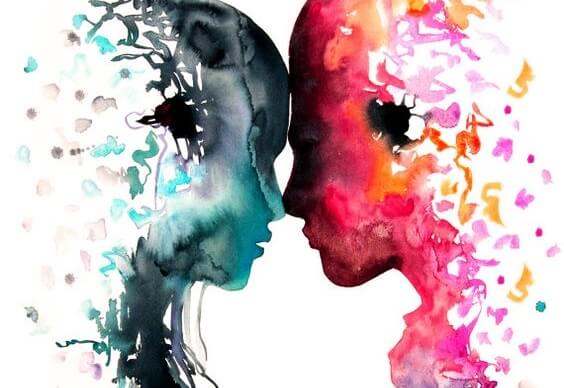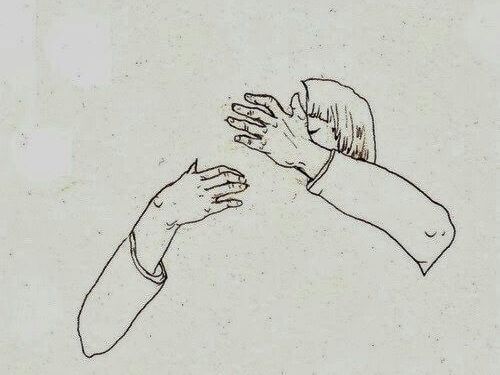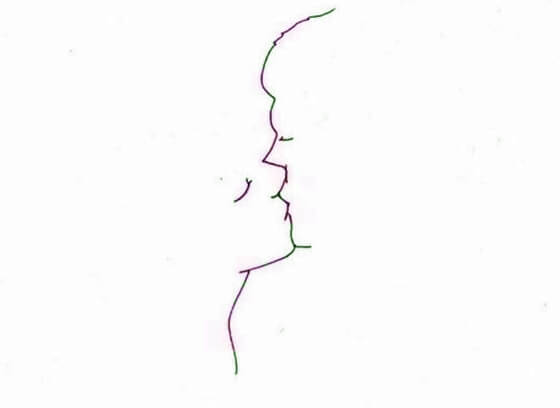My Love for You Goes Far Beyond Attachment, Habit or Fear of Being Alone

Consciously loving means to love oneself first so that we can rid ourselves of unhealthy attachments or the cold emptiness that we obligate others to soothe. Loving in a mature way means to freely give ourselves to another in an act of true honesty, but never to soothe our loneliness, and certainly never in a way that we lose our dignity.
Einstein himself said once that love could never be explained under the lens of science, because that biological, chemical and fascinating thing can never be quantified or observed under a microscope. Because, if there is anything that neurology has proven today, it is that love is addictive.
“Love is not just wanting, but also understanding.”
-Francoise Sagan
Advances in the field of neuroscience can, in many instances, dispel our feeling of romanticism and that poetic aura that can envelope our relationships, just like poisoned candy. Love is laced with dopamine, so that many times we fall as if we were drugged into a bond that costs us a lot to escape from, or even to see the harm it is causing us.
Love is blind, we know this, and we can all fall into one of those relationships based on an insane attraction, suffocating and intense at the same time. However, it is our responsibility to open our eyes to truly see ourselves first. A relationship that depersonalizes us, that removes our most inner selves, where self-esteem and self-confidence are located, is not healthy. It is like burning ourselves up in the fire of an undeserved unhappiness.

Love Based on Attachment is Pure Addiction
There have been more studies on heartbreak than on love associated with obsession, and addiction. There is a very simple explanation for this: historically and culturally the image has been projected that excessive love, passionate, dominating and blind is something admirable, positive and even inspiring.
We have to admit…we have all been sold on the idea that the best loves are those that are all or nothing. Those where we fuse the two half’s of our hearts to make one whole heart, where we are the breath the other breathes, we are rescued from all our fears and cured of our loneliness. However, we need to be very careful with these ideas, because they all hide something farcical, bittersweet brushstrokes and the ruthless poison of deception.
We have to keep this clearly in mind, relationships based on affectionate attachment are insane because they all hold in their hand that eraser that can do away with all the ‘self’ of our personality: self-esteem, self-concept, self-respect, etc. Furthermore, when we become subordinate to this type of co-dependent love, as strange as it may seem, it is not easy to clearly see what blinds us. It doesn’t matter that others warn us, it is of no use that they tell us we are not that “type of person.”
Love based on attachment is obstinate and blind, and it does not make heads nor tails, so when a big and broken heart needs their drug, the side-effects are relentless.

I Love You Beyond the Fears, Loneliness and Habit
Neurologists tell us that love is obsessive because it is regulated by serotonin, and is even inclined towards recklessness because both the cerebral cortex and the amygdala lose a little bit of control of their “chain of command.” That being said, just because many of our behaviors are the result of all that chemical shipwreck does not mean we cannot love in a healthy way, and have a happy, satisfactory and full relationship.
“Detachment does not mean you have nothing. It means nothing has you.”
-Ali ibn Abi Talib
The best thing to do in these cases, is to first invest in your own personal growth, to manage your fears, become emotionally mature people and not those who are eternally looking for someone to nurture their needs.
Just as was said by Antoine de Saint-Exupery, love is not looking constantly at each other. Because in the end we will end up losing all perspective. Loving consciously is being able to harmonize our hearts so that together we can see the beauty of the world, always united on the same path. It is what we can call “an awareness of being a couple.”

This marvelous aspect, “awareness of being a couple,” is based on the three C’s on which we should reflect for a moment:
- Compromise. Compromise is not just based on a complete, respectful attachment to another person, but also to ourselves. We should take care of our own psychological well-being so that we can commit fully to the one we love.
- Communication. All happy and stable couples have the ability to communicate when the need arises, they do so assertively, by means of active listening, with empathy and the type of closeness that leaves no room for egotism nor blackmail.
- Correspondence. Correspondence is nothing other than a reciprocity where we understand that loving is not just giving, it is also receiving. A couple is not a competition of strengths, but rather a team that can come to agreements, an alliance where both win, where personal growth of our loved one is considered an investment in the relationship.
In conclusion, we should understand that the variable of love is not enough in the equation of a couple. A relationship is like a muscle that needs to be exercised by means of a sense of humor, respect and personal freedom. We should be capable of encouraging a healthy detachment based on the absence of fear, co-dependency, and above all, on non-addiction.
Consciously loving means to love oneself first so that we can rid ourselves of unhealthy attachments or the cold emptiness that we obligate others to soothe. Loving in a mature way means to freely give ourselves to another in an act of true honesty, but never to soothe our loneliness, and certainly never in a way that we lose our dignity.
Einstein himself said once that love could never be explained under the lens of science, because that biological, chemical and fascinating thing can never be quantified or observed under a microscope. Because, if there is anything that neurology has proven today, it is that love is addictive.
“Love is not just wanting, but also understanding.”
-Francoise Sagan
Advances in the field of neuroscience can, in many instances, dispel our feeling of romanticism and that poetic aura that can envelope our relationships, just like poisoned candy. Love is laced with dopamine, so that many times we fall as if we were drugged into a bond that costs us a lot to escape from, or even to see the harm it is causing us.
Love is blind, we know this, and we can all fall into one of those relationships based on an insane attraction, suffocating and intense at the same time. However, it is our responsibility to open our eyes to truly see ourselves first. A relationship that depersonalizes us, that removes our most inner selves, where self-esteem and self-confidence are located, is not healthy. It is like burning ourselves up in the fire of an undeserved unhappiness.

Love Based on Attachment is Pure Addiction
There have been more studies on heartbreak than on love associated with obsession, and addiction. There is a very simple explanation for this: historically and culturally the image has been projected that excessive love, passionate, dominating and blind is something admirable, positive and even inspiring.
We have to admit…we have all been sold on the idea that the best loves are those that are all or nothing. Those where we fuse the two half’s of our hearts to make one whole heart, where we are the breath the other breathes, we are rescued from all our fears and cured of our loneliness. However, we need to be very careful with these ideas, because they all hide something farcical, bittersweet brushstrokes and the ruthless poison of deception.
We have to keep this clearly in mind, relationships based on affectionate attachment are insane because they all hold in their hand that eraser that can do away with all the ‘self’ of our personality: self-esteem, self-concept, self-respect, etc. Furthermore, when we become subordinate to this type of co-dependent love, as strange as it may seem, it is not easy to clearly see what blinds us. It doesn’t matter that others warn us, it is of no use that they tell us we are not that “type of person.”
Love based on attachment is obstinate and blind, and it does not make heads nor tails, so when a big and broken heart needs their drug, the side-effects are relentless.

I Love You Beyond the Fears, Loneliness and Habit
Neurologists tell us that love is obsessive because it is regulated by serotonin, and is even inclined towards recklessness because both the cerebral cortex and the amygdala lose a little bit of control of their “chain of command.” That being said, just because many of our behaviors are the result of all that chemical shipwreck does not mean we cannot love in a healthy way, and have a happy, satisfactory and full relationship.
“Detachment does not mean you have nothing. It means nothing has you.”
-Ali ibn Abi Talib
The best thing to do in these cases, is to first invest in your own personal growth, to manage your fears, become emotionally mature people and not those who are eternally looking for someone to nurture their needs.
Just as was said by Antoine de Saint-Exupery, love is not looking constantly at each other. Because in the end we will end up losing all perspective. Loving consciously is being able to harmonize our hearts so that together we can see the beauty of the world, always united on the same path. It is what we can call “an awareness of being a couple.”

This marvelous aspect, “awareness of being a couple,” is based on the three C’s on which we should reflect for a moment:
- Compromise. Compromise is not just based on a complete, respectful attachment to another person, but also to ourselves. We should take care of our own psychological well-being so that we can commit fully to the one we love.
- Communication. All happy and stable couples have the ability to communicate when the need arises, they do so assertively, by means of active listening, with empathy and the type of closeness that leaves no room for egotism nor blackmail.
- Correspondence. Correspondence is nothing other than a reciprocity where we understand that loving is not just giving, it is also receiving. A couple is not a competition of strengths, but rather a team that can come to agreements, an alliance where both win, where personal growth of our loved one is considered an investment in the relationship.
In conclusion, we should understand that the variable of love is not enough in the equation of a couple. A relationship is like a muscle that needs to be exercised by means of a sense of humor, respect and personal freedom. We should be capable of encouraging a healthy detachment based on the absence of fear, co-dependency, and above all, on non-addiction.
This text is provided for informational purposes only and does not replace consultation with a professional. If in doubt, consult your specialist.







